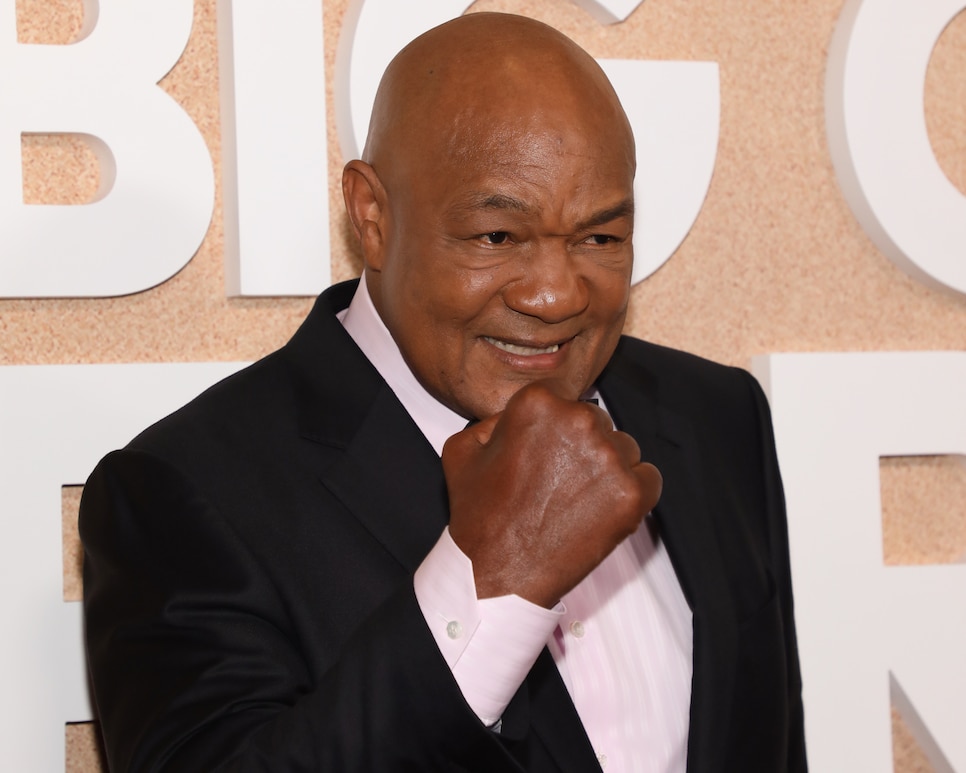Remembrances
George Foreman once shared remarkably prescient thoughts on Tiger Woods' comeback and future

Paul Archuleta
The news of George Foreman’s death at age 76 came as a shock. The two-time heavyweight champion and Olympic gold medalist was a force of nature, not only in his awesome physical abilities but also verbally, as a product pitchman and HBO boxing analyst, and especially in deep recall of an inspirational life filled with amazing turnarounds. The biggest was arguably the greatest comeback in the history of sports— regaining his title at 45 years of age, after a 10-year hiatus from boxing and more than 20 years after he’d been upset by Muhammad Ali in 1974.
Foreman didn’t play golf, but he was an interested observer of Tiger Woods, especially during the period a decade ago in which Woods was inactive due to spinal surgery and still on the psychic mend from the humiliation of highly-publicized infidelities. In a 2016 story on Woods during that period, I called Foreman at his home in Houston to get his perspective on a possible Woods comeback. In candid comments that would verge on prescient after Woods won the 2018 Tour Championship, followed by the 2019 Masters, Foreman began by referencing the aftermath of losing his title to Ali in Zaire by being rope-a-doped and ultimately knocked out in the eighth round.
"I was humiliated, ashamed, embarrassed—all of the above," Foreman said. "And when you're the undefeated champion, recovering psychologically from a defeat like I had is a very hard thing to go through. I lost a part of myself, and it took me a long time to get it back."
Foreman became reclusive. His next fight, a slugfest with Ron Lyle in which Foreman was knocked down twice before desperately managing to knock out Lyle, felt like a flashback. "When I was on the canvas against Lyle, I thought, Oh, it's happening all over again. I'm nothing,’" Foreman said.
Three years later, Foreman left boxing to become preacher in Houston and wouldn't fight again for a full 10 years. He resumed fighting to support a financially strapped youth center bearing his name.
"The original George Foreman, I never did recapture that timing,” he said. “I couldn't do it my old way anymore, beating guys to the punch and knocking them out in the first round, and I had to accept that. If I wanted to be heavyweight champion of the world again, I would have to perfect things that I had never done before."
Foreman remembered Sam Snead, then in his 70s, visiting his training camp and imparting some advice. "He supported my comeback, telling me how he'd stayed competitive even when he couldn't be the Slammer in the same way," he said. "Tiger has to figure out some of the same things I did. He's had some shame and humiliation. He did a lot of things that a lot of athletes do; he just got caught. But I think he's gotten up, or will get up from that. The big thing is, he has to stop trying to play like the Tiger Woods of 21. There's an edge he's going to have to give up. Don't try to go back and get what you used to have. Use what you have now. He can still be great, because that's still inside him. Even after I changed my style, the inside of me never changed.”
It’s safe to say that today, once again on the shelf from injury, the inside of Woods hasn’t changed either.

